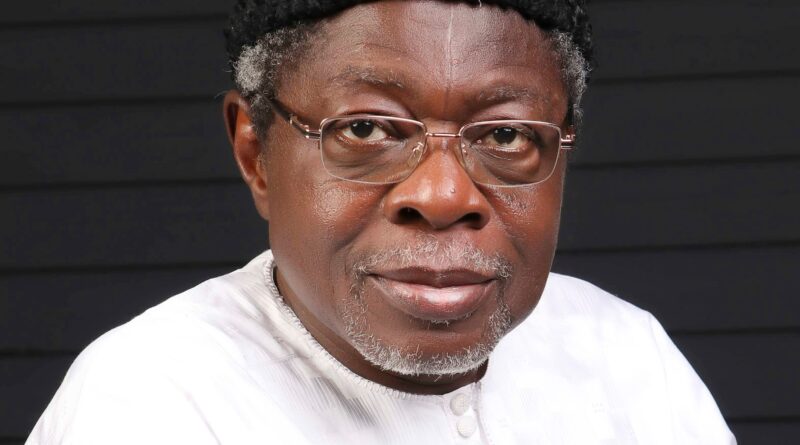I want to talk about Tinubu, even though I lost my mother, by Hassan Gimba
On Monday, January 8, I lost my mother. She died at the age of 85. Despite the age being ripe, it was still a shock. It is normal for a child to see his parents as immortal despite an ingrained knowledge that every soul shall taste the inevitable – death.
She succumbed to a debilitating pulmonary disease, something I think I inherited. She died on the 8 and her husband, Suleiman Gimba Ahmed on the 6 of January 2013. However, I want to talk about President Bola Ahmed Tinubu.
There was a time when I was hopeful that I could get Medicare abroad, after going to some hospitals here, and she, being more worried about my condition, was happy for me when I broke the “good news” to her. But I told her, “God willing, we are going together, “sai ki samu kiyi Umrah.” She became doubly excited. But then, I want to talk about Tinubu.
I recall that Adamu Maina Waziri, after the normal condolences, told me: “This death, like it happened to me, will fully open the door to your full maturity, because even the last time I saw her, she requested that I look after and guide you as if you were a baby.” To which I told him, “Yes sir, surely I’ll feel her absence and care, kam, even though there’s a sort of relief. Because of my ailment, I fear going before her because I know how devastated she would have been. Alhamdu lilLah.” But do not mind me, it is Tinubu I want to talk about.
Of course, she was sick, challenged by various ailments, like almost everyone her age. Same with me, but not everyone will know, especially if their contact with me is through phone conversations or on this page. Perhaps when one is dead, then the talks will begin. But then, one will just be laughing at those who doubted. Anyway, I just want to talk about Tinubu.
It will just be like the case of Spike Milligan, an Irish comedian and writer who died in 2002. Perhaps to get his last laugh at doubters and “experts”, he caused to be written on his tombstone, as an epitaph, “Dúirt mé leat go raibh mé breoite”, in the Gaelic language, or “I told you I was ill”, in English. The Daily Mail declared the epitaph as “Britain’s Favourite Epitaph.” But what concerns one with the Gaelic language, after all, it is Tinubu I want to talk about.
I am yet to write an epitaph for her, not to talk of a befitting tribute, still numbed by shock, living in a daydream. I have vehemently refused to cross over to reality. Perhaps when I come out of the reverie, I may pen down something. Until then, let me talk about Tinubu.
Well, I want to talk about Tinubu, as I said. But let me tell a brief story of Prophet Musa (AS), or Prophet Moses (Peace be upon him), who was mentioned in the Qur’an and also in the Bible. Of course, the Attaura, or the Torah, Old Testament, Pentateuch is his book.
He was born at a time when the Pharaoh (Fir’aun) was killing all newborn males for fear of a man he was told would come to destroy his evil empire and ways. His mother threw him into the sea, thrusting him into the care of God almighty, trusting that He would save her son. And that He did.
Prophet Musa grew up in the Palace of the Pharaoh, surrounded by whatever the Pharaoh was known with and for. However, even though he fully knew what was happening, he did not indulge in any of the perfidies associated with the palace.
And when the time ordained by God came, Prophet Musa challenged the Pharaoh, despite all his pomp and arrogance, which pushed him into proclaiming himself, “I am your god most high!”
Prophet Musa proved to be the albatross of the Fir’aun.
Now, to Tinubu. Many stories, unsubstantiated, abound that he was fully aware of all the corrupt practices taking place in Nigeria, a country that was battling so hard to become the palace of perfidies.
He has proved all doubters and nay-sayers wrong by tackling corruption and the corrupt head-on.
It is not a secret that even within his party, there were some powerful forces at the highest level that did not want his emergence as the party’s presidential flag bearer. These powerful forces, who wanted power for its sake, straddled the political sphere and held the country by the jugular, wreaking havoc on the nation’s economy. Badly hit was the central bank which they turned into their automated teller machine.
Tinubu, assumedly part of them, is now proving the difference. A year ago, nothing would have happened to Betta Edu, the minister of Humanitarian Affairs. The nation can shout to the high heavens, but no investigations would have been carried out to verify the authenticity of the allegations against her.
It was as if corruption was an adornment and the corrupt got rewarded. A lady diverted date fruit worth millions of dollars sent to Nigeria by Saudi Arabia meant for internally displaced people. The items were diverted and sold to the public by a lady with itchy fingers. Yet, despite national outrage, she was “promoted” to a more “lucrative” position.
When the then secretary to the government of the federation was indicted of diverting funds meant for grass cutting, it took the combined efforts of the National Assembly, civil society organisations, the press and, most significantly, President Buhari being away on a medical trip, before the SGF was shown the way out.
In this country, some people said they spent hundreds of billions of naira to feed school children who were at home during the COVID-19 lockdown.
It is on record that former President Muhammadu Buhari had accused Godwin Emefiele, Central Bank governor under President Goodluck Jonathan, of giving out (and misappropriating) billions of dollars based on notes written on “ordinary paper” or “bread paper”, meaning he did not follow due process in what he did before 2015, and that he was part of the locust years before Buhari was elected based on his “integrity and honesty”, yet despite all that he was retained on the job; was it for him to continue the heist?
Now see the rot coming out from that direction as is being revealed by Jim Osayande Obazee, a first-class chartered accountant and former chief executive officer of the Financial Reporting Council of Nigeria, saddled with investigating those leaky days.
Who would have thought that Tinubu, a man raised and bred in a nation (that he is knowledgeable of) hurtling towards perdition, would be the man destined to take us to the Promised Land?
But there is a good sign that he may be the one.
Hassan Gimba is the Publisher and Editor-in-Chief of Neptune Prime.



